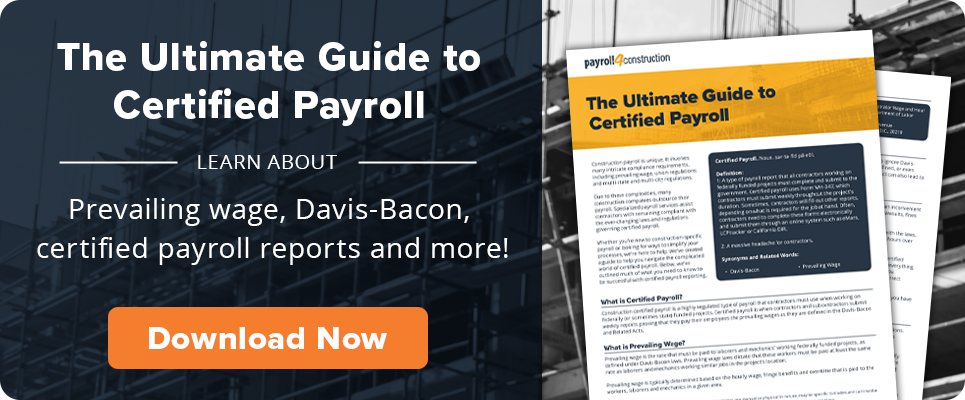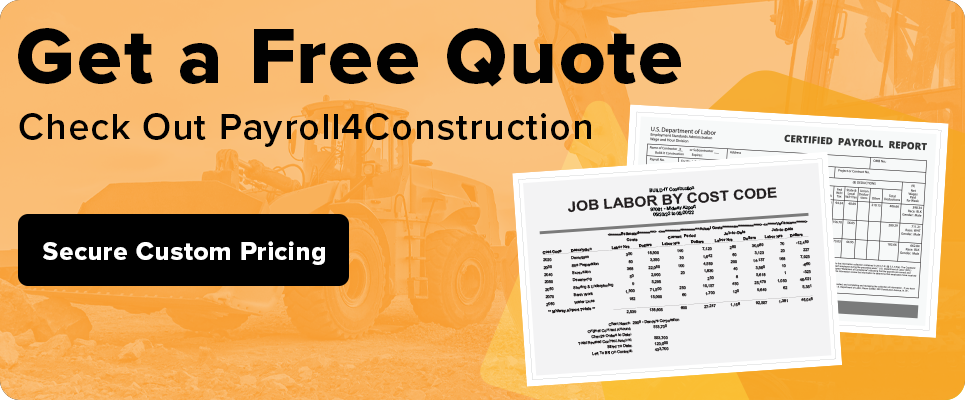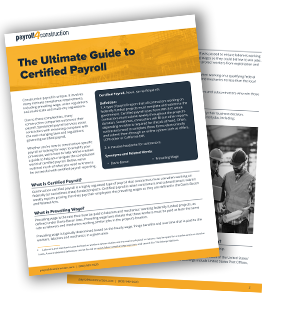The Union Contractor’s Guide to Simplifying Payroll

December 28, 2023
Hiring unionized workers is an attractive option for contractors looking for a highly skilled and adaptable workforce, as unionized construction workers are often well-trained, well-certified, and up-to-date on industry standards.
However, managing unionized workers can have a complicated impact on payroll. First off, each trade has a union, and then each union has different bargains in place that determine wage rates, work hours, and fringe benefits. This makes payroll processing tedious as contractors balance multiple workers that have varying pay rates and deductions from different unions. To add to the complexity, improper union payroll can cause legal issues for contractors.
But it’s essential for any construction professional wanting to hire a skilled workforce to understand union payroll.
What are Unions in Construction?
Being a member of a union offers a way for workers to collectively negotiate wages, benefits, and working conditions. Unions are designed to level the playing field between workers and employers while ensuring that labor standards are met. According to Associated Builders and Contractors (ABC), 11.7% of workers in the construction industry belong to a union.
Unions ensure workers are equipped with legal protections and maintain that the workplace environment prioritizes worker health and safety. Unions also offer extensive industry training programs, competitive wage rates, and comprehensive benefits.
What is Union Payroll?
Union payroll refers to the process of paying workers who are members of labor unions. This is done according to the terms and conditions outlined by a collective bargaining agreement (CBA). A CBA is a written agreement between an employer and an employee’s union that specifies agreed-upon payment terms. The agreements set the rules for compensation, including wage rates, overtime, and benefits.
Union payroll ensures that construction workers are paid in accordance with these CBAs. Payroll processing for union employees involves accurately calculating and disbursing wages, tracking hours, managing benefits, and complying with specific union regulations.
What Makes Union Payroll Different?
Union contracts impact the rules and regulations of all business operations, as union payroll reporting is closely monitored by the government. This includes ensuring that workers are paid in accordance with collective bargaining agreements. Federal and state government agencies oversee labor standards, wage and hour regulations as well as workplace safety.
Additionally, tax agencies monitor and enforce proper withholding and reporting of income and payroll taxes. These agencies will conduct routine audits to ensure compliance with union requirements. This requires contractors to keep accurate union reporting and recordkeeping.
As contractors navigate multiple CBAs with different unions, some specific aspects of union payroll processing that need to be considered include:
- Wages
An easy way of looking at union employee pay is to break it up into three amounts: hourly wages, gross wages, and net pay.
- Hourly Wages: The amounts paid to employees for all hours worked. This base rate of pay is typically specified in the employee contract or union agreement. These amounts are subject to employment taxes and withholdings similarly to a non-union employee. Union contracts will outline different hourly wage rates based on job classifications, experience levels and more.
- Gross Wages: The total amount of money an employee earns before deductions. Contractors determine the employee’s gross wages for the given pay period to include overtime, premium pay, on-call time and any other pay agreements previously made. After calculating the employee’s gross wages, the contractor then applies the appropriate taxes and withholdings to calculate the union employee’s net pay.
- Net Pay: The amount of money union employees receive on their paychecks after deductions have been subtracted from their gross pay. Once tax deductions, union dues, health insurance premiums, retirement contributions, and more are subtracted from the gross pay, their net pay will reflect their true earnings.
If there is a mistake in calculating pay or an adjustment in their working hours, union employees will require payments off-cycle or outside the regular payroll period. If a labor agreement is renegotiated or modified to consider other benefits or wage rates, off-cycle pay is required. Bonuses and special payments can also result in an off-cycle payment.
- Tax Rates
Union employees experience different tax rates. The main difference is between pre-tax deductions and post-tax deductions.
Pre-tax Deductions: Deductions are taken from an employee’s paycheck before any income taxes are withheld. The amounts are not included in the employee’s gross wage and typically include payments to health insurance, retirement (non-Roth), pension plans, and more.
Post-tax Deductions: Deductions are taken from an employee’s paycheck after all income and payroll taxes have been withheld. Post-tax deductions reduce net pay rather than gross wages and typically include union dues, wage garnishments, Roth IRA retirement plans, and more.
Translated: a union employee’s post-tax deductions (which include their union dues) are taken from their net pay. If net pay is ever reduced, the contractor must ensure they have a signed dues deduction authorization from each employee before reducing the employee’s pay and remitting the amount to the union.
- Fringes vs. Deductions
Union benefits are tracked, taxed, and calculated in different ways. Union rate tables will differentiate which benefits are fringes and which are deductions.
- Deductions are taken out of an employee’s paycheck. For example, a bi-weekly pay stub may include a $45 deduction for an employee pension fund.
- Fringes are additional money contractors pay through benefits or cash. For example, a bi-weekly pay stub may include an additional $25 payment towards healthcare.
- Fringe benefit contributions include any payments to third-party funds that are jointly managed by representatives from labor and management. The contractor calculates these amounts based on the number of hours worked and remits payments to the individual funds.
Additionally, each member of a union pays dues, typically a dollar amount equivalent to 1-2% of the worker’s gross earnings. When union dues are payable depends on the specifications in the union contract, however most union dues are deducted right from a worker’s paycheck and deposited directly into the union’s account. This is marked as a deduction on all paychecks with other deductions such as income tax and insurance.
- Multiple States
For contractors completing projects that cross city and state lines, different taxes will be owed to each worker. Paying union workers who work in multiple states requires the contractor to navigate the labor laws, tax regulations, union agreements, wage rates, and tax withholdings for each state.
The agreed-upon union rate may also change based on location. In cases where there are government contracts adhering to prevailing wage rates and areas that have a higher cost of living or are in high demand for construction labor, the formerly agreed-upon pay rate may increase. If this is the case, it will be specified in the CBA.
Keeping track of these various factors requires a job code per worker that corresponds to a specific set of regulations. For example, if an employee works in Indiana one week and Ohio the next, a distinct job code should be created for each of these, even if the rate of pay is the same. This makes it easier to associate hours worked with the relevant set of regulations.
- Government Jobs
The Davis-Bacon Act mandates that contractors working on government jobs or federally funded projects pay their workers no less than the prevailing wage rates in the local area, as determined by the U.S. Department of Labor. Davis-Bacon jobs effectively adopt the union wage scales to ensure workers are compensated at a level consistent with the labor standards advocated by construction unions. These union agreements are what drive the prevailing wage rates, but union contractors are still required to complete certified payroll reports for city, state and federal jobs.
Public agencies require contractors to submit certified payroll reports as part of the accountability and transparency measures. This allows them to verify that construction workers are paid as stipulated in union agreements and in accordance with the law.
What are the Common Mistakes Made When Processing Union Payroll?
Due to the complicated nature of union payroll, mistakes are common. Late or incorrect payments to workers and incomplete reporting can lead to fines, loss of future union contracts, and potential legal actions filed against your company.
A few of the biggest errors occurring include:
- Incorrect Wage Rates: Failing to accurately apply the correct wage rates based on the specific job classifications and union agreements can lead to underpayment or overpayment of wages, violating the terms of the union contract and opening companies up for lawsuits.
- Neglected Fringe Benefits: Neglecting to include fringe benefits in the payroll calculations can result in non-compliance.
- Inaccurate Overtime Calculations: Mistakes in calculating overtime and double-time rates, particularly when working with irregular hours, can lead to incorrect pay and potential violations of labor laws.
- Late or Incomplete Reporting: Missing deadlines for submitting payroll reports to unions or government agencies or submitting incomplete or inaccurate reports can result in fines.
- Rate Changes: Union agreements may undergo updates or amendments, leading to changes in wage rates, benefits, and other terms. Not staying informed about these changes and updating payroll systems accordingly can lead to discrepancies.
- Recordkeeping: Poor recordkeeping of employee hours, wages, benefits, and deductions can create difficulties in responding to audits and demonstrating compliance with labor agreements.
- Misclassification of Employees: Incorrectly classifying workers as independent contractors instead of employees violates union agreements and can have tax implications.
- Discrepancies: If an employee notices a discrepancy in their paycheck, it’s essential to address it promptly and transparently. Ignoring or delaying resolution can lead to dissatisfaction and mistrust among union employees.
How Can Contractors Simplify Union Payroll?
There are several steps that construction contractors can take to simplify the union payroll process:
- Centralize Payroll Processing: If possible, centralize payroll processing by consolidating payroll-related tasks to one department or location within the company. This helps ensure consistency across multiple projects and locations, can streamline processes, and reduce confusion.
- Standardize Data Collection: Implement a standardized system for collecting time and attendance data. This can include digital timesheets, biometric systems, or mobile apps. Consistent data collection ensures accurate payroll calculations.
- Regular Training: Ensure that your payroll team, managers, and supervisors receive regular training on union payroll processes, any updates to labor agreements, or changes to regulations.
- Implement Robust Recordkeeping: Maintain thorough and organized records of all payroll-related information, including union agreements, timecards, benefit contributions, and any adjustments made. Accurate recordkeeping is essential for government audits, keeping this information organized will help to mitigate errors.
- Communication with Unions: Establish clear lines of communication with union representatives. Maintain open dialogue to address any discrepancies, changes in labor agreements, or other issues promptly.
- Automate Reporting: Leverage automation to generate and submit required payroll reports to unions and regulatory agencies. This can help reduce administrative burden and ensure timely compliance.
- Regular Audits: Conducting regular internal audits to review payroll data for accuracy and compliance and identifying discrepancies early will help to avoid issues down the line.
- Review Processes: Continuously review and refine your payroll processes to identify areas for improvement. Seek feedback from the payroll team and other stakeholders to streamline workflows.
- Consult with Experts: When dealing with complex aspects of union payroll, consider consulting with labor experts or legal counsel to ensure you are fully compliant with labor laws and union agreements.
- Employee Self-Service: Implement self-service portals for employees to access their pay stubs, tax forms, and benefit information. This reduces administrative tasks and empowers employees.
- Stay Informed: Keep up to date with changes in union agreements, labor laws, and regulations that may affect payroll. Being proactive about staying informed can prevent costly mistakes. It helps to stay up to date with changes in union agreements, labor laws, and regulations that may affect payroll.
To successfully avoid mistakes requires frequently reviewing the CBA. The union agreement will outline the processes for union workers, including overtime changes, off-cycle pay, termination checks, and more. Knowing the CBA will also help to establish clear lines of communication with union representatives.
How Can a Payroll Service Manage Union Payroll?
An effective way to simplify union payroll is to invest in a construction payroll service designed to handle union payroll. Outsourcing payroll can help to automate calculations and manage different wage rates and benefits as well as union-specific requirements. A payroll service can also easily generate union reports every pay period and track CBAs for each employee.
Specialized payroll services, like Payroll4Construction, can handle the complexities that come with union payroll. We understand the nuances of union labor agreements, stay updated on changes in regulations and union agreements, maintain accurate records, and prioritize clear communication with both union representatives and employees. Top of Form
Simplify Union Payroll With A Construction Payroll Service
Union payroll processing is different per job, and every contractor will need to find a system that works best for them. There may be no universal answer for streamlining the process, but you can limit the stress of reporting by focusing on tracking and recording your union employees’ hours accurately. Or, by going a step further and investing in a construction-specific payroll system that will do it for you.
Share Article



